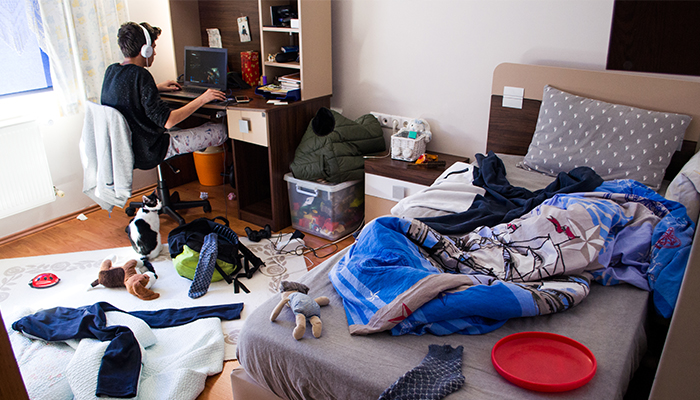Maintaining open and respectful lines of communication with their bundles of teenage joy can seem unattainable for parents as they sally forth into yet another family skirmish.

Broken curfews, messy bedrooms, too much screen time… the points of contention in the rebellious teen years can proliferate like pimples.
But all need not be lost, says Macquarie University academic Vince Hurley. Using the right negotiation tactics can help prevent or resolve many a fraught situation between parents and teens.
An Associate Lecturer in the Department of Security Studies and Criminology, Hurley came to Macquarie University after an illustrious 29-year career in the NSW Police Force, including eight years as a hostage negotiator.
Hurley deploys those negotiation skills with his own four children, aged from 11 to 16, including twins.
One thing that you learn as a negotiator, and I do it at work and in my daily life, is that if someone comes to you and vents, don’t cut them short.
There is of course a material difference between his kids and hostage-takers: Hurley knows and has a huge emotional investment in the former; the latter were strangers with whom he had zero attachment.
There is also the hard, cold fact that a parent is never going to win every battle with their teen.
But, just like a police negotiator, a parent can arm themselves well by first knowing and understanding an issue, because only then can they address it with confidence and keep focused on it, says Hurley, who also teaches crisis communications to students of Macquarie’s Global MBA.
Here are his tips for navigating the broken rules and bolshie attitudes that define many a teen journey.
Watch your tone
The tone in your voice as you deal with an issue is critical, says Hurley. You should make it calm and level, and never be condescending or malicious.
“The tone in which you say something is just so important because it sends a message to the child so if you are flustered or angry or you are losing your control, then they may think, ‘Well I’ve got Mum or Dad on the ropes, so I am just going to ignore them’.
“Whereas if you are direct, and use a calm and level tone, they can’t second guess what you might be thinking or what your next step is, so you’re sort of calling their bluff just by the tone of your voice.
“And the tone should never be friendly because as a parent you are not their friend - and as a negotiator, I am not there as their friend but to resolve the problem.”
Let them vent
Listening is key to any negotiation process, and even as teens push their parents’ buttons, parents have to bite their tongue at times “to the point where it bleeds, but we have to treat them with dignity, respect them, and let them be heard,” says Hurley.

“One thing that you learn as a negotiator, and I do it at work and in my daily life, is that if someone comes to you and vents, don’t cut them short.
“If the teen says for example, ‘I don’t want to get off the Internet’, let them vent, let them tell their story as to why they shouldn’t, and as Mum and Dad just shut up and listen to them; you don’t have to agree with them, just let them get it out of their system.
“And while that’s happening you say ‘Yes, ok, I see your point, I understand,’ giving them acknowledgement that you’re hearing their message.”
The power of walking away
Venting is fine, as long as it’s not rude – there is no excuse for rudeness (on the proviso you are not rude to them).
“If they are being rude while venting, cut the conversation off short. You say, ‘I don’t speak to you like that, I am not going to accept you speaking to me like that.’
“Be assertive, not aggressive, and send a clear signal that being rude is unacceptable.
“You can even say, ‘I want you to stop and think about what you’ve just said, and how you’ve said it,’ and walk away.
“Just make sure there is absolute clarity about what you are saying and doing so there can be no misinterpretation of the situation.”
Depending on the issue, you can text them rather than do it face to face; it can take the eye rolling and huffing and puffing out of the equation.
Walking away can defuse a tense situation, Hurley says. “I just go about and do my business; once the heat has gone out of the argument, in about five or 10 minutes, then I will go back to them and say, ‘Is there anything you would like to say about what’s just happened?’ So you have defused the situation by punctuating it.”
Turning on your heel is also a good tactic when you are mad as hell. While Hurley would never reveal his anger to a hostage-taker, he says it’s OK to let your kids know you’re a tad furious – although it’s best to calm down before tackling the matter at hand.
“I will say to them, ‘I am going to talk about this later with you, but right now I am too angry and too disgusted in your behaviour and I am going to walk away'.”
Hurley suggests writing down your ideas or things you want to say before returning to the issue, especially if it is an ongoing one, when the heat has gone out of the situation.
“Also, depending on the issue, you can text them rather than do it face to face; it can take the eye-rolling and huffing and puffing out of the equation.”
Don't be in a hurry to resolve things then and there
Whether angry or your usual measured self, there is no reason you have to resolve an issue straight away.

“You don’t have to actually address the problem then and there, you can kick the can down the road because sometimes, an issue needs to bubble away in the background, particularly in their mind and also in your mind, to come to a resolution,” says Hurley.
“And that may be an hour later, or later that day – you don’t want to leave it too long because it will diminish in importance; the teen thinks that Mum or Dad have forgotten about it, or that it’s not as important as they initially said.”
Hurley recommends involving teens in coming up with the consequences for their actions.
“Ask them what they see as a suitable plan or punishment or consequence,” he advises.
“I’ll ask, ‘What do you think the consequence should be?’ and they’ll say, ‘An hour less on the iPad’ and I’ll say, ‘I think it should be two’…”
In cases where, for instance, they have done the wrong thing towards someone, “Ask them what they would impose on themselves if the reverse happened, or if a friend treated them like that.
“Personalise it by using a close friend or someone they can identify with.”
Don't let anyone else butt in
As a police negotiator, you don’t get involved in a three-way conversation by bringing another police officer into the negotiation. It’s confusing and may send mixed messages, Hurley explains.
“Another person could unintentionally undermine the work that you have done and jeopardise any 'plan' you have in trying to resolve the situation,” he says.
- New artificial intelligence can predict personality
- Smart phones are making us stupid: and may be a gateway drug
This is no different in a family situation.
“Don’t let the other partner or parent or sibling butt into a conversation. The other adult or sibling may have a different take or relationship with the child and the child may use that to undermine the other parent or to split the conversation by saying ‘but Dad said’ or ‘but Mum doesn't do that’.
“Don’t muddy the waters!”
Use the 5WH
The 5WH – the what, why, when, where and how – can be an effective way to frame communications.
“If you’re in a conversation with a teen, and you don’t think you’re getting through to them, ask them the 5WH, because they will happily give you their opinion,” Hurley says.
The 5WH is a handy tool to deploy before you jump to conclusions. Which brings us to the next negotiator’s rule:
Don't assume
So, curfew was 10pm, but your teen comes home at 1am, after failing in the meantime both to ring in as promised, and to answer your calls.
“Don’t just assume that they haven’t come home on time because they are being defiant – there could be a logical, innocent explanation to it,” Hurley says.
So, instead of telling off the teen for what they haven’t done, use the 5WH to find out what actually happened. “Listen to their story first before passing any judgement. They might say they were having such a good time they lost track of time, or that they didn’t hear their phone ring over the crowd. There can be valid reasons for why things don’t happen.
“As a police negotiator, you have to have a full understanding of the situation or of the individual; you don’t just rush in. Of course it’s easier to make assumptions with your children than it is with a stranger, but try to understand the reasons they offer, even if you don’t agree with them, because that reason could be so important it’s caused this rule-breaking behaviour.”
If your teen has come home a little worse for wear, it will be completely pointless to engage, says Hurley, so delay all of the above until the next day.
"The first thing I learnt in the police, even before I became a police negotiator, is you can’t rationalise with someone who is drunk.”
Give notice
If you want your kids to do something – say get off the internet, or go and have a shower - don’t just demand they do it straight away, says Hurley; rather, put them on notice.
- TMI: The cognitive science behind why you can't read all your emails in a day
- Sleep loss plus social media bad combo for teens
“I will say to my kids, ‘I want you to get off the internet in 10 minutes’; then I’ll tell them when they’ve got five minutes left. I don’t just come along and say ‘I want you to get off it now’. They could be in the middle of homework and it could interrupt their concentration, or in the middle of chatting to someone, which could be important to them.
“Giving them warning or leeway is an easy way of easing them into the situation as you want it to be.”
Use humour
Another tactic you can use as a negotiator is humour, which can also defuse an argument, Hurley says. You need to know your child’s sense of humour and what makes them laugh, and not use the strategy so often that it becomes predictable.

“I will say something I know they will find amusing to act as a circuit breaker. I will watch for their reaction and if they smile, I’ll say something like, ‘It’s not as bad as you think’, then they will generally say something, and I will say ‘I agree that it’s hard you can’t be on social media, or that you can’t always remember to put your clothes in the washing basket, but you are not the only one; it happens to everybody.’ ”
Smiling can also work wonders if you think you are getting through during a conversation. “If you smile at others, they generally will smile back. You naturally wouldn’t do it in the middle of a fierce blue; it is all about timing.“
Never lie, and never break a promise
A police negotiator never lies, says Hurley, because they or their colleagues can sometimes later find themselves in the same situation with the same person – and they are going to have little credibility the second time around if they’ve previously lied, making the crisis that much harder to resolve.
Most children want to think you are treating them fairly. If they can see that then generally they will agree.
Same goes for kids. Parents need to maintain their credibility. And if you’re not lying to your kids, it sets a good example for them not to lie to you.
“I say to the kids: ‘Don’t lie, because I don’t lie to you. And in turn I expect you to be truthful and honest with me, and there is nothing you will tell me that will surprise me.’ ”
Police negotiators also will never make a promise, “because you can’t guarantee it will occur”, says Hurley.
With your kids, ‘I’ll think about it’, or ‘possibly’, are magic words that give parents time to consider whether a sleepover for six on Saturday night is really something they want to say ‘yes’ to.
But if you think your teen is telling porkies …
“Tell ‘em!” Hurley says. “Tell them ‘I don’t believe you are telling me the truth, I am going to find out what the truth is, and between now and then I want you to think about the consequences and what you are going to do to rectify this situation.
“‘You have one of two choices – you can either keep lying to me, or you can tell me the truth.’ Put it back to them.”
And finally, remember that …
Anything is negotiable ... almost
If you have a recalcitrant child, negotiation sometimes won’t work, but with the average kid on the street, you can negotiate most things, Hurley says. As well as consequences, that includes rules.
For instance, “If you know they are on social media three hours a day, and you want to get them down to 90 minutes, I will say ‘I am going to give you one hour’, and if they baulk or don’t accept it, then I might say, ‘OK, an hour and 15, or 20 minutes’.
“This comes across as you being fair and reasonable. Most children want to think you are treating them fairly. If they can see that then generally they will agree.”
Hurley says negotiation has benefits over old-fashioned “what-I-say-goes” parenting because it makes children understand that there are consequences for every action.
“And if and when the time comes, and they have done something outrageous, like broken the law, you have in your back pocket the ability to say that – whereas in the past we have negotiated over social media or because you haven’t done your homework or made your bed, or you’ve sworn in the house – there is no negotiation over this. And that sends a strong signal. There is just a consequence - bad luck, you’re grounded for a month.”
- Vincent Hurley is a former police officer and detective of 29 years experience who specialised in hostage negotiations. He is Associate Lecturer in the Department of Security Studies and Criminology at Macquarie and also teaches crisis communications in the Macquarie Business School.



